In today's digital age, a business's online reputation can make or break its success. Consumers often make decisions based on what they find online, making online reputation management crucial for small businesses.
Businesses that prioritize online reviews can gain a significant advantage over their competitors and attract more customers.
But, negative reviews can significantly harm a business's reputation, which is why small businesses must be vigilant about their online presence.
This article will review one of the most unavoidable parts of business in 2023 and examine compelling online review statistics that every business should know to stay ahead of the competition in the ever-changing online world.
1. Online Reviews Influence Buying Decisions
Online reviews significantly impact consumer behavior, and they have become an essential part of the decision-making process for many customers.
According to one study, a whopping 98% of consumers read online reviews before making a purchase, with 84% trusting online reviews as much as personal recommendations (Exploding Topics).
With such a high percentage, it is clear that consumers rely heavily on the opinions of others before deciding to purchase a product or service.
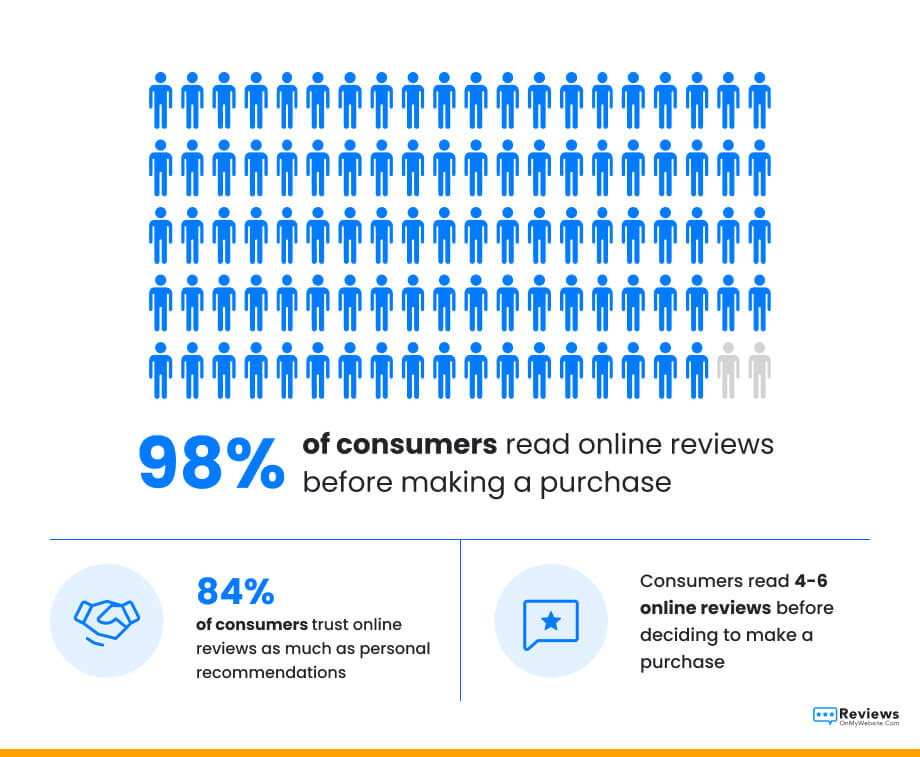
On average, consumers read 4-6 online reviews before deciding to make a purchase (findstack). Not only do online reviews influence purchasing decisions, but they also have a direct impact on a business's revenue.
For example, one study found that 58% of consumers said they would pay more for a brand's products with good reviews (Luisa Zhou).
Furthermore, Harvard Business Review reported that a one-star increase in a business's rating on a platform like Yelp lead to a 5-9% increase in their revenue, which shows how powerful online reviews can be in driving sales and revenue growth.
Key online review statistics
- 98% of consumers read online reviews before making a purchase
- 84% of consumers trust online reviews as much as personal recommendations
- Consumers read 4-6 online reviews before making a purchase decision
- A one-star increase in a business's rating can lead to a 5-9% increase in revenue
- 58% of consumers said they would pay more for a brand's products with good reviews
2. Negative Reviews Have a Major Impact on Small Businesses
Businesses must pay attention to negative reviews, which can significantly impact their reputation.
Studies show that 86% of consumers are less likely to buy from a business with negative online reviews (Exploding Topics). In addition, a staggering 94% have avoided a business altogether due to negative feedback (Qualtrics).
Negative reviews can also result in 4 out of 5 consumers changing their minds about a business altogether (Digital Resource). This can translate into losing around 30 customers, or 22% of a business’s leads (CMG Local Solutions), which highlights the importance of constantly generating positive reviews.
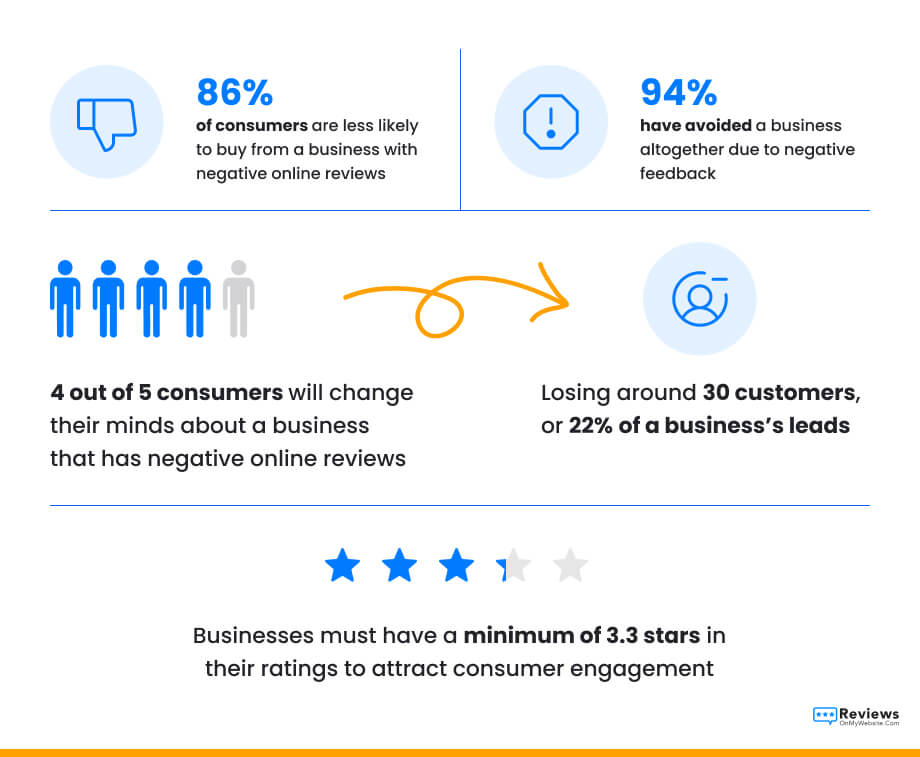
Notably, 97% of consumers will read a business's response to a negative review (Oberlo), which strongly suggests that addressing negative feedback is essential to any business's success.
According to Qualtrics, businesses must have a minimum of 3.3 stars in their ratings to attract consumer engagement.
Additionally, 13% of consumers won’t even consider trying a business with a 1 or 2 star rating. Companies that can increase their star rating by even just 0.1% will see an average increase in conversions of about 25% (findstack).
Online reputation management and monitoring are particularly important when negative reviews appear on the first page of search results, which can be even more damaging to a business's image.
Key online review statistics
- 86% of customers are less likely to purchase from a business with negative reviews
- 94% of people have avoided a business based on negative feedback
- Negative reviews result in about 4 out of 5 consumers changing their minds about a business
- One negative review can cost a business 22% of its customers (around 30 people)
- 97% of consumers will read a business's response to a negative review
- Businesses must have a minimum of 3.3 stars in their ratings to attract consumer engagement
- 13% of consumers won’t even consider trying a business that has a 1 or 2 star rating
- Businesses that increase their star rating by 0.1% will see an increase in conversions by 25%
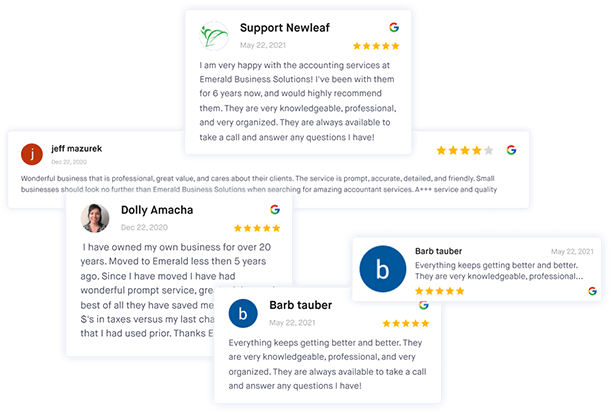
Manage online reviews with ease
Monitor, manage, and get more online reviews for your business with ReviewsOnMyWebsite.
3. Online Reviews Influence Search Engine Optimization
Effective digital marketing strategy today requires the integration of Search Engine Optimization (SEO) as a critical component.
While many businesses focus on optimizing keywords and content, the impact of online reviews on search ranking is often overlooked.
However, research shows that online reviews can significantly influence local search rankings. According to Moz, online reviews contribute 15.44% to how Google ranks local search results.
Moreover, online reviews have become a critical tool for consumers in evaluating a business's local relevance.
In fact, a recent study conducted by BrightLocal found that 91% of consumers use online reviews to assess a business's credibility in their local area. This highlights the significance of online reviews in driving local business success.
It's also important to note that when it comes to searching for a local business's reviews, Google is the platform of choice for most consumers.
A staggering 63% of consumers rely on Google search engines, while 54% turn to Facebook, and 32% use Yelp. With such a massive reliance on Google, businesses need to ensure that they have a strong presence and positive reviews on this platform to succeed in local search rankings (Exploding Topics).
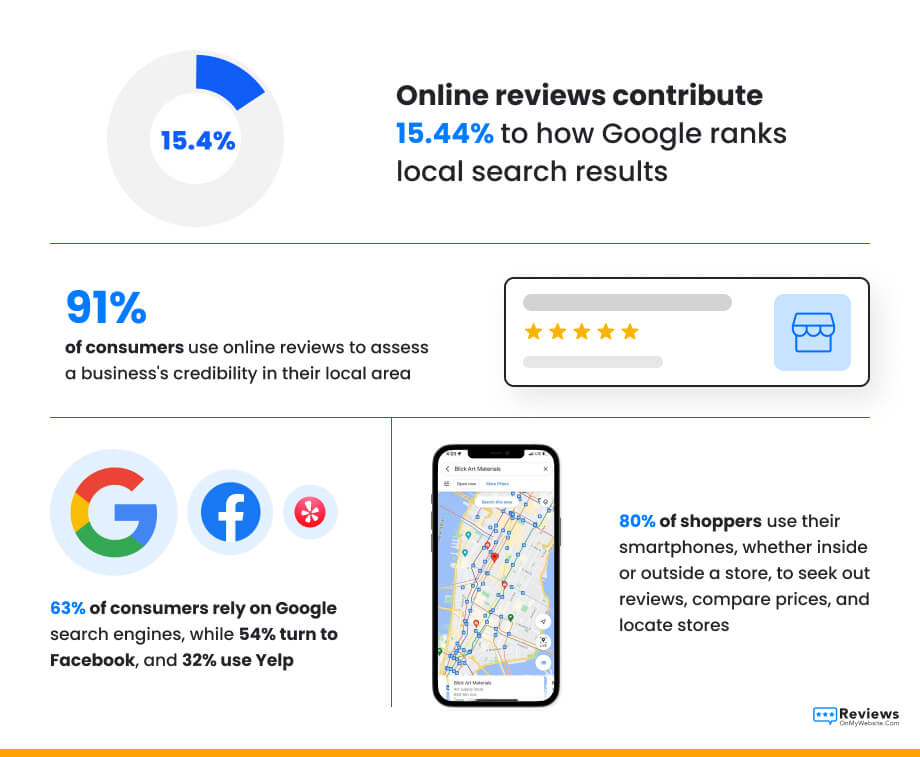
Even when shopping in physical stores, customers still rely on online reviews from fellow shoppers. Additional research shows that 80% of shoppers use their smartphones, whether inside or outside a store, to seek out reviews, compare prices, and locate stores (Findstack).
However, the impact of online reviews on search ranking is not limited to businesses with physical locations. Even for online-only businesses, having positive reviews can significantly impact their search ranking.
A study by Local SEO Guide found that online reviews are the most critical ranking factor for online-only businesses. Therefore, positive reviews and a steady stream of new reviews are crucial for businesses to improve their search ranking and attract more customers.
Key online review statistics
- 91% of consumers use online reviews to evaluate a business's local relevance
- Online reviews account for 15.44% of how Google ranks local search results
- 63% of consumers rely on Google search engines when seeking reviews, 54% turn to Facebook, and 32% use Yelp.
- 80% of shoppers use their smartphones to seek out reviews
- Online reviews are the most critical ranking factor for online-only businesses
4. Social Media Has a Lot of Power Over Online Reputation
Undoubtedly, the rise of social media has given consumers a platform to share their experiences with a global audience. As a result, social media has become an essential tool for businesses to connect with customers and promote their brands.
According to a recent survey, 75% of consumers use social media to learn about a brand, and 45% say they are more likely to research a brand after seeing an ad on social media (Sprout Social).
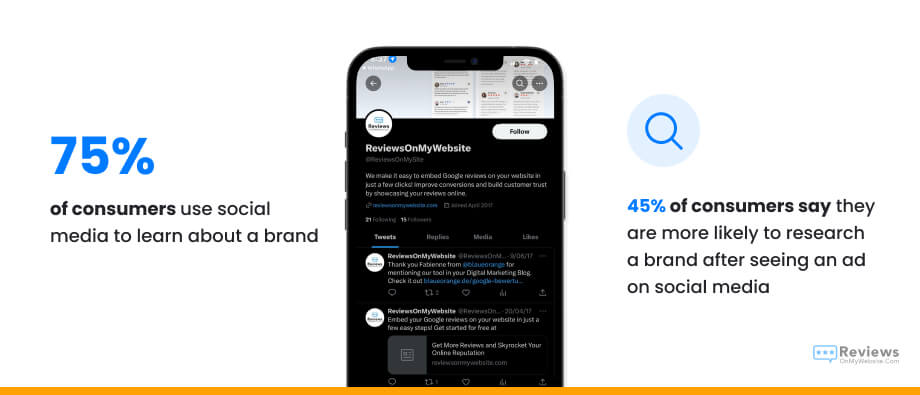
Social platforms like Instagram and now TikTok have skyrocketed in popularity, almost acting as search engines in their own right. So it is no surprise that 32% of people use Instagram, and 20% consult TikTok before deciding to use a local business (BrightLocal).
The power of user-generated content, in this instance, cannot be underestimated. As a result, consumers trust other consumers over businesses when making purchasing decisions, leading to a rise in influencer marketing.
This approach has proven effective, with a recent study finding that companies earn an average of $5.20 for every $1 spent on influencer marketing (Influencer Marketing Hub).
However, social media can also be a double-edged sword. For example, negative comments on social media can cause a 15% drop in sales (Harvard Business Review). This is especially true when an average of 45% of consumers use social media to complain about a business online (Convince & Convert).
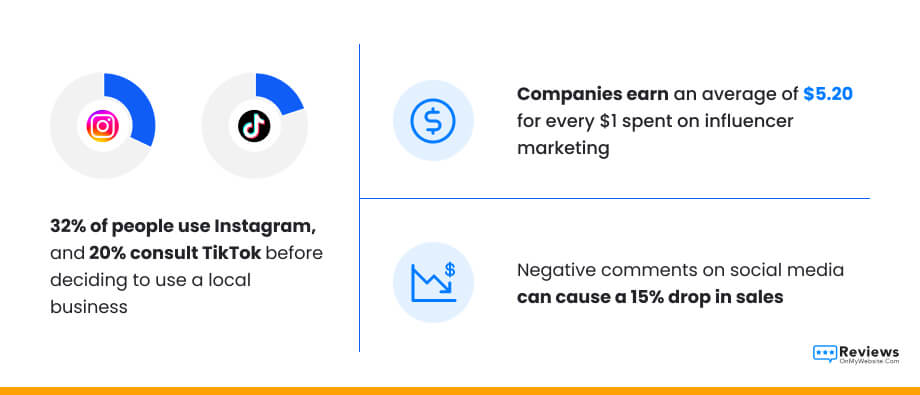
Overall, 89% of consumers say they have reached out to a brand on social media before making a purchase (Sprout Social), meaning that businesses must have a presence on social media and actively engage with their customers to ensure positive experiences are shared online.
Key online review statistics
- 75% of consumers use social media to learn about a brand
- 45% of consumers are more likely to research a brand after seeing an ad on social media
- 32% of people use Instagram when deciding to use a local business
- 20% of consumers consult TikTok when deciding to use a local business
- Companies earn an average of $5.20 for every $1 spent on influencer marketing
- Negative comments on social media can cause a 15% drop in sales
- 45% of consumers use social media to complain about a business
- 89% of consumers say they have reached out to a brand on social media before making a purchase
5. 5 Online Reputation Management Strategies for Small Businesses
For small businesses, managing their online reputation can be a daunting task. However, there are some effective strategies that can help improve their online presence and attract more customers.
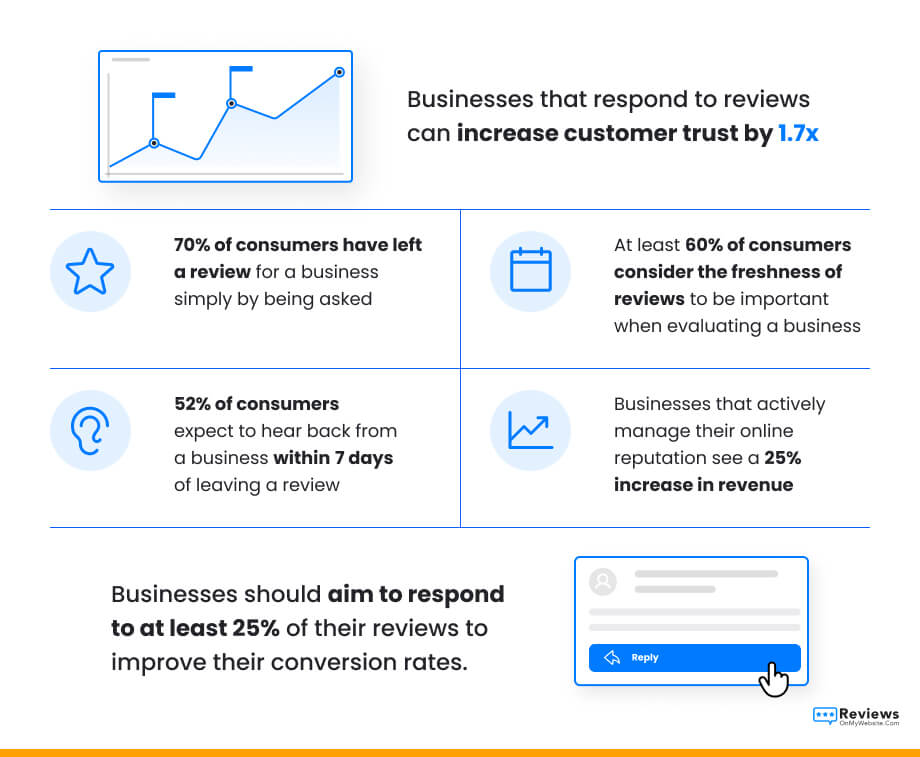
Firstly, as mentioned, it is crucial for small businesses to regularly monitor their online reviews and respond promptly to any negative feedback.
According to one researcher, businesses that respond to reviews can increase customer trust by 1.7x (Trustpulse). This means businesses should always address negative reviews and thank customers who leave positive reviews.
Another effective strategy is to regularly encourage satisfied customers to leave positive reviews. According to another study, 70% of consumers have left a review for a business simply by being asked (BrightLocal).
In addition, at least 60% of consumers consider the freshness of reviews to be important when evaluating a business (Podium). This means businesses should actively request reviews from their customers and make it as easy as possible for them to leave a review.
Businesses should also aim to respond to reviews within a reasonable time frame. For example, one study found that 52% of consumers expect to hear back from a business within 7 days of leaving a review (Orberlo). Therefore, businesses must prioritize responding to reviews promptly to avoid losing customers.
Furthermore, businesses that actively manage their online reputation see a 25% increase in revenue (Podium). This means that businesses should invest time and resources in managing their online reputation and ensuring they have a positive online presence.
Finally, businesses should aim to respond to at least 25% of their reviews to improve their conversion rates. A study by Womply found that businesses that respond to at least 25% of their reviews average a 35% higher conversion rate overall (fera.ai).
Key online review statistics
- Businesses that respond to reviews can increase customer trust by 1.7x
- 70% of consumers have left a review for a business after being asked
- 60% of consumers consider the freshness of reviews to be important when evaluating a business
- 52% of consumers expect to hear back from a business within 7 days of leaving a review
- Businesses that actively manage their online reputation see a 25% increase in revenue
- Businesses that respond to at least 25% of their reviews average a 35% higher conversion rate

Manage online reviews with ease
Monitor, manage, and get more online reviews for your business with ReviewsOnMyWebsite.
6. The Future of Online Reputation Management
As we have seen from deep-diving into some of the top online review statistics, online reputation management is crucial for small businesses in 2023.
Online reviews have become a powerful tool for consumers to express their opinions and experiences with businesses. In addition, the increasing use of social media and review management platforms makes leaving feedback more accessible than ever.
As customer feedback has become more accessible, online reputation management has posed new challenges in recent years.
The accountability of review platforms regarding fake reviews is more critical than ever, with a surge of spam and deceptive content. This highlights the need for businesses to actively monitor and safeguard their online reputation.
The 2022 Yelp Trust and Safety Report analyzed over 206,000 reviews and found that 25% did not reflect first-hand customer experiences.
Evaluating the perception of trust across different platforms in today's constantly evolving digital landscape is crucial. Research indicates that fraudulent reviews are unacceptable to 62% of consumers, who believe they should be removed.
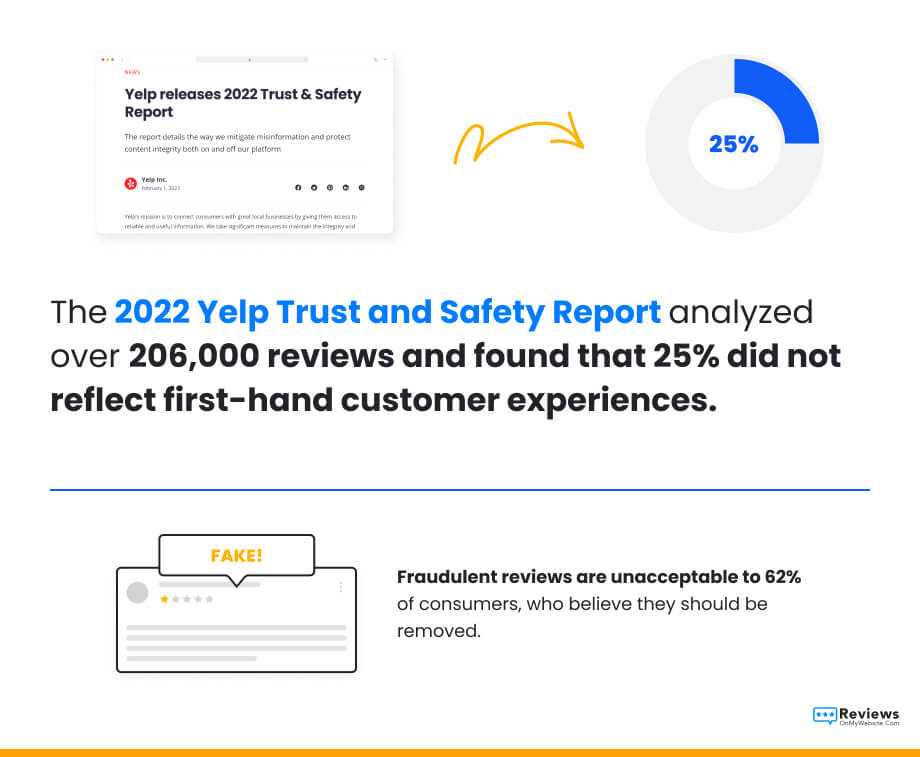
The future of online reputation management will continue to evolve alongside technology and consumer behavior. As a result, businesses must prioritize and focus on their online reputation management strategies to ensure they not only meet but exceed customer expectations moving forward.
Key Takeaways
To ensure a positive online reputation, it's crucial to keep a close eye on both positive and negative reviews, engage with customers on social media, and take proactive steps to encourage new feedback to help enhance customer satisfaction.
Prioritizing your online reputation with tools like ReviewsOnMyWebsite can help you attract new customers, establish trust with existing ones, and stay ahead of the competition.
Remember that your online reputation reflects your business, so focus on delivering exceptional customer experiences to ensure positive feedback.




